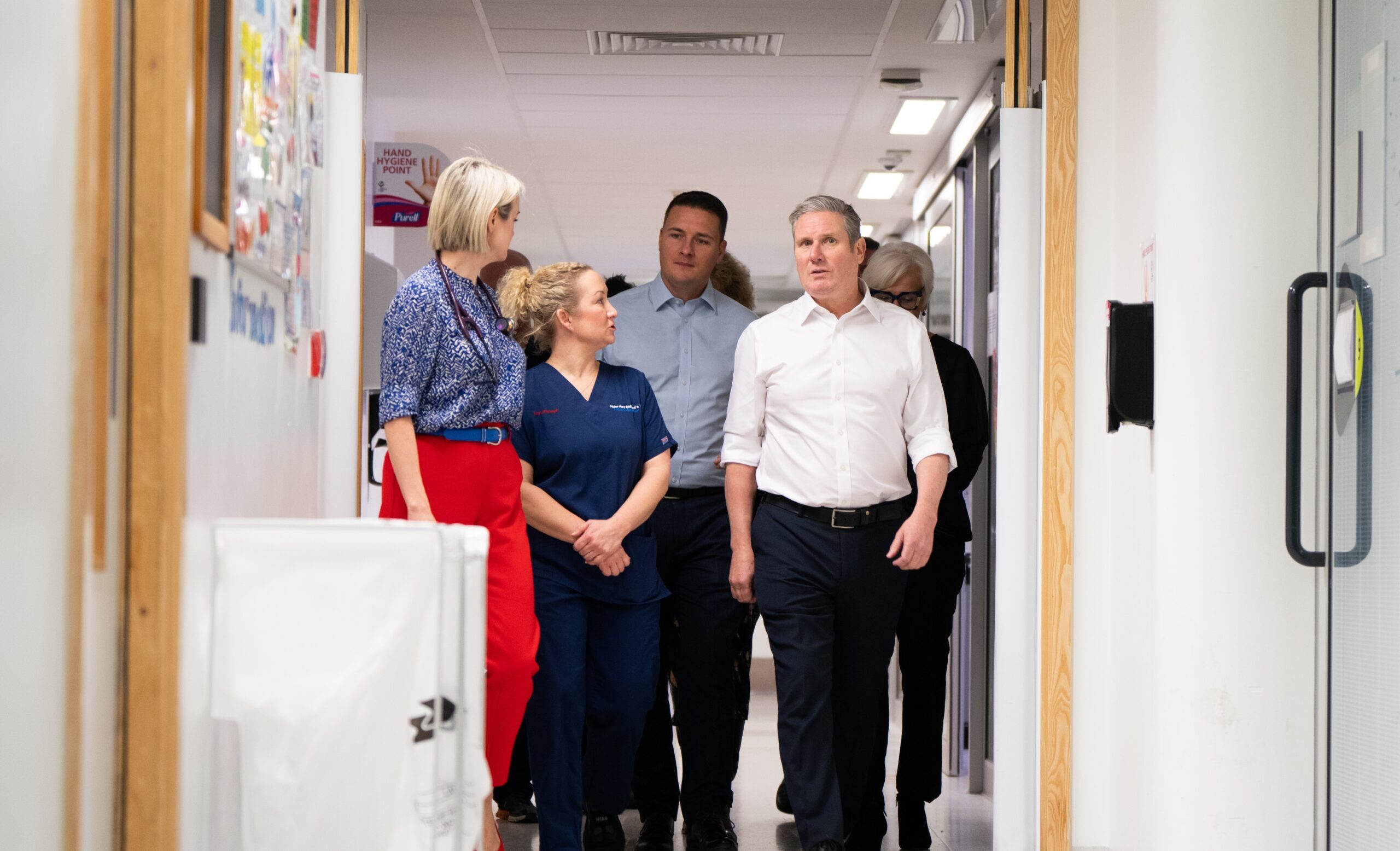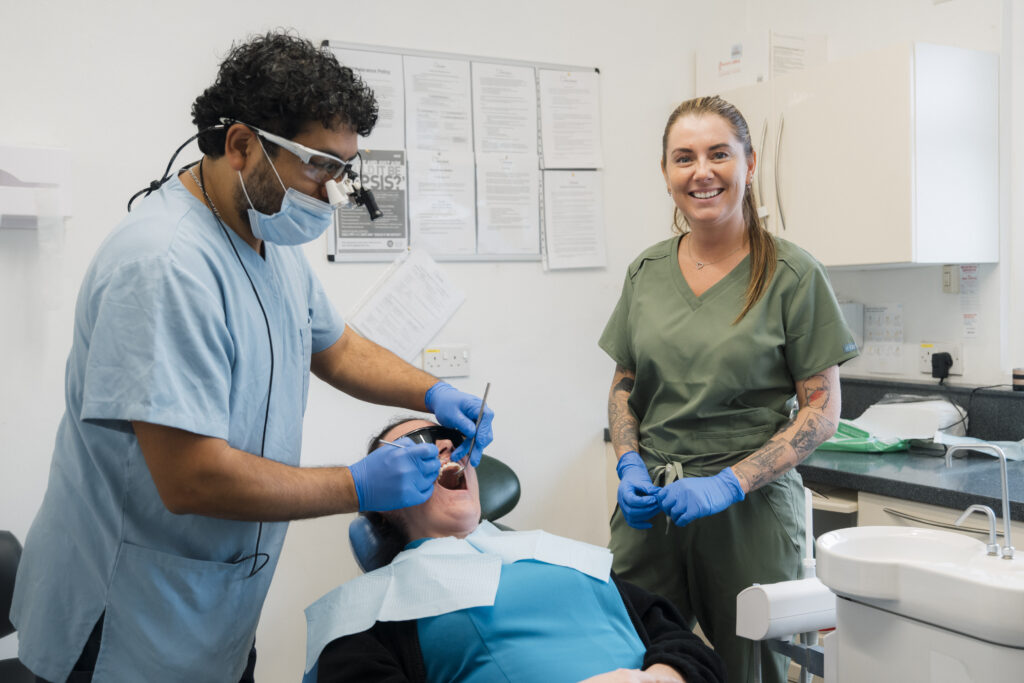Build an NHS fit for the future

How Labour will build an NHS fit for the future:
- Cut NHS waiting times with 40,000 more appointments every week
- Double the number of cancer scanners
- A new Dentistry Rescue Plan
- 8,500 additional mental health staff
- Return of the family doctor
Skip to:
The 1945 Labour government founded our National Health Service on principles that have stood the test of time:
The best health services should be available, free for all. Money should no longer be the passport to the best treatment. People should get the best that modern science can offer.
For decades the NHS has served us well, with those values enduring. These are the principles which will underpin the next Labour government’s plan to reform the NHS.
But as we look at the NHS now, it is clearly broken – and the Conservatives broke it. Whilst the Covid-19 pandemic placed the NHS under unprecedented stress, the reality is waiting lists were at record highs even before it struck. Rather than healthcare being ‘free for all’, we now find ourselves with a de facto two-tier system – with working people regularly forced to scrape together the means to go private. Meanwhile, over the past 14 years, the ‘winter crisis’ cycle has become part of the national calendar. Every year, a new crisis is declared. Then, every year, the Conservatives reach for a sticking plaster patch-up to get through the winter, without ever addressing the root cause.
This is a situation Labour is familiar with: we have saved the NHS before, and the next Labour Government will do so again. With Labour, it will always be publicly owned and publicly funded. But our ambition goes beyond returning the NHS to what it was. Labour’s mission is to build an NHS fit for the future. Investment alone won’t be enough to tackle the problems facing the NHS; it must go hand in hand with fundamental reform.
We must change the NHS so that it becomes not just a sickness service, but able to prevent ill health in the first place. It must also reflect the change in the nature of disease, with a greater focus on the management of chronic, long-term conditions. And we will deliver a renewed drive to tackle the biggest killers; cutting the lives lost to cancer, cardiovascular disease and suicide, while ensuring people live well for longer.
Labour’s reforms will shift our NHS away from a model geared towards late diagnosis and treatment, to a model where more services are delivered in local communities. We will harness the power of technologies like AI to transform the speed and accuracy of diagnostic services, saving potentially thousands of lives. And we will embed a greater focus on prevention throughout the entire healthcare system and supporting services. As we knew in 1945, much avoidable ill health can be prevented.
The factor that is markedly different from the past decades is our understanding of mental health. Across society, mental health has stepped out of the shadows, yet it is difficult to argue the NHS has kept up. Indeed, Britain is currently suffering from a mental health epidemic that is paralysing lives, particularly those of children and young people. This is a tragedy – arguably nothing says more about the state of a nation than the wellbeing of its children. So right at the core of our mission will be a bold new ambition to raise the healthiest generation of children in our history. And, as a crucial part of that, we will reform the NHS to ensure we give mental health the same attention and focus as physical health.
Get the NHS back on its feet
We should all be able to trust that the NHS will be there for us when we need it, whether it is a GP appointment, an ambulance, or help at A&E. Labour’s immediate priority on health will be to get a grip on the record waiting list. We will return to meeting NHS performance standards. That means patients should expect to wait no longer than 18 weeks from referral for consultant-led treatment of non-urgent health conditions. This standard was achieved with the last Labour government and will be again under the next.
As a first step, in England we will deliver an extra two million NHS operations, scans, and appointments every year; that is 40,000 more appointments every week. We will do this by incentivising staff to carry out additional appointments out of hours. Labour will pool resources across neighbouring hospitals to introduce shared waiting lists to allow patients to be treated quicker. Recognising the urgent need to bring down waiting lists, Labour will use spare capacity in the independent sector to ensure patients are diagnosed and treated more quickly.
Getting the NHS back to working for patients means ending the workforce crisis across both health and social care. When one in seven people in hospital do not need to be there, joint working is essential. Labour will ensure the publication of regular, independent workforce planning, across health and social care. We will deliver the NHS long-term workforce plan to train the staff we need to get patients seen on time.
Too many patients have seen their treatment affected by strikes. Labour will reset relations with NHS staff, moving away from the Conservatives’ failed approach.
Labour’s first steps: Cut NHS waiting times
Modernising the NHS
A system reliant on pagers and fax machines is not fit for this decade let alone the next. Too many cancer deaths could have been prevented with earlier diagnosis. The NHS has fewer diagnostic scanners per person than other countries, with many ageing machines operating for long after they should. State of the art scanners with embedded AI are faster and more effective at finding smaller tumours, saving lives. Therefore, Labour will introduce a new ‘Fit For the Future’ fund to double the number of CT and MRI scanners, allowing the NHS to catch cancer and other conditions earlier, saving lives.
It is also clear that NHS estates are in a state of disrepair after years of neglect. Labour is therefore committed to delivering the New Hospitals Programme.
The revolution taking place in data and life sciences has the potential to transform our nation’s healthcare. The Covid-19 pandemic showed how a strong mission-driven industrial strategy, involving government partnering with industry and academia, could turn the tide on a pandemic. This is the approach we will take in government. As part of Labour’s life sciences plan, we will develop an NHS innovation and adoption strategy in England. This will include a plan for procurement, giving a clearer route to get products into the NHS coupled with reformed incentive structures to drive innovation and faster regulatory approval for new technology and medicines.
Drawing on the strength of our National Health Service, Labour will also maximise our potential to lead the world in clinical trials. This means making the process more efficient and accessible, by speeding up recruitment and giving more people a chance to participate through the NHS app. This will mean putting Britain at the forefront of transforming treatment for dementia.

Power to the patients
At the heart of every medical decision must be patients and their families. Too many are not treated with the respect they deserve or given the information they need to adequately access services and navigate the system.
Labour will therefore transform the NHS app, putting patients in control of their own health to better manage their medicine, appointments, and health needs. This will include giving performance information on local services, and notifications of vaccinations and health checks. Patients will be able to see the medical guidelines for the treatment they should get, to hold health services to account and understand what their choices are.

Ensuring patient safety
Childbirth should not be something women fear or look back on with trauma. Labour will ensure that trusts failing on maternity care are robustly supported into rapid improvement. We will train thousands more midwives as part of the NHS Workforce Plan and set an explicit target to close the Black and Asian maternal mortality gap.
Labour will digitise the Red Book record of children’s health, improving support for new families. We will also enable vaccinations for babies and children as part of health visits.
So much of the treatment in the NHS is dependent on the effective administration of services. Managers need support and accountability. Labour will implement professional standards and regulate NHS managers, ensuring those who commit serious misconduct can never do so again. And we will establish a Royal College of Clinical Leadership to champion the voice of clinicians.
We will work to implement the expert recommendations of the Cass Review to ensure that young people presenting to the NHS with gender dysphoria are receiving appropriate and high-quality care.

Healthcare closer to home
The National Health Service needs to move to a Neighbourhood Health Service, with more care delivered in local communities to spot problems earlier. To achieve this, we must over time shift resources to primary care and community services.
GPs are the front door to the health service for most people. Excellent primary care is the key to earlier diagnosis, but too often it is not possible to get an appointment, so Labour will reform the system. We will train thousands more GPs, guarantee a face-to-face appointment for all those who want one and deliver a modern appointment booking system to end the 8am scramble. We will bring back the family doctor by incentivising GPs to see the same patient, so ongoing or complex conditions are dealt with effectively.
Labour will also take the pressure off GP surgeries, by improving access to services and treatment through new routes. We will create a Community Pharmacist Prescribing Service, granting more pharmacists independent prescribing rights where clinically appropriate. We will allow other professionals, such as opticians, to make direct referrals to specialist services or tests, as well as expanding self-referral routes where appropriate.
The principle of integrating health and care services will improve the treatment patients receive. We know that more of this care needs to happen outside hospitals. Therefore, we will trial Neighbourhood Health Centres, by bringing together existing services such as family doctors, district nurses, care workers, physiotherapists, palliative care, and mental health specialists under one roof.

Dentistry Rescue Plan
Getting an NHS dentist is increasingly a lottery and the consequences are dire. The most common reason children aged five to nine are admitted to hospital is to have rotting teeth removed. Labour will tackle the immediate crisis with a rescue plan to provide 700,000 more urgent dental appointments and recruit new dentists to areas that need them most. To rebuild dentistry for the long term, Labour will reform the dental contract, with a shift to focusing on prevention and the retention of NHS dentists. We will also introduce a supervised tooth-brushing scheme for 3- to 5-year-olds, targeting the areas of highest need.

Social care reform
Labour is committed to ensuring everyone lives an independent, prosperous life. Social care is vital to achieving this, but hundreds of thousands of people suffer without the care they need for a dignified life. The sector needs deep reform: there are inconsistent standards, chronic staff shortages, and people are not always treated with the care, dignity and respect they deserve.
Labour will undertake a programme of reform to create a National Care Service, underpinned by national standards, delivering consistency of care across the country. Services will be locally delivered, with a principle of ‘home first’ that supports people to live independently for as long as possible. Our new standards will ensure high-quality care and ongoing sustainability, and ensure providers behave responsibly. Labour will develop local partnership working between the NHS and social care on hospital discharge.
We will enhance partnership working across employers, workers, trade unions and government and establish a Fair Pay Agreement in adult social care. This sector collective agreement will set fair pay, terms and conditions, along with training standards. Labour will consult widely on the design of this agreement, before beginning the process and learn from countries where they operate successfully.
Labour is committed to ensuring families have the support they need. We will guarantee the rights of those in residential care to be able to see their families. As part of the efforts to move healthcare into local communities and professionalise the workforce, we will task regulators with assessing the role social care workers can play in basic health treatment and monitoring.
Alongside these changes, we will build consensus for the longer-term reform needed to create a sustainable National Care Service. We will explore how we best manage and support an ageing population; how integration with the NHS can be secured; how to best support working age disabled adults; and how to move to a more preventative system.
Improving mental health
The NHS has struggled to keep up with greater awareness of the challenges of mental health. Waiting lists for those referred for support are too high, and shamefully so for young people.
Labour will bring waiting times down and intervene earlier. We will recruit an additional 8,500 new staff to treat children and adults through our first term. As part of our mission to reduce the lives lost to suicide, these new staff will be specially trained to support people at risk. Labour’s new Young Futures hubs will provide open access mental health services for children and young people in every community.
Mental health legislation is also woefully out of date. The treatment of people with autism and learning difficulties is a disgrace. The operation of the Mental Health Act discriminates against Black people who are much more likely to be detained than others. Labour will modernise legislation to give patients greater choice, autonomy, enhanced rights and support, and ensure everyone is treated with dignity and respect throughout treatment.
“We had to wait over a year for an appointment”
Haruna, security manager, former Conservative voter
Action on public health
Prevention will always be better, and cheaper, than a cure. So, we must take preventative public health measures to tackle the biggest killers and support people to live longer, healthier lives.
That starts with smoking. Labour will ensure the next generation can never legally buy cigarettes and ensure all hospitals integrate ‘opt-out’ smoking cessation interventions into routine care. Labour will ban vapes from being branded and advertised to appeal to children to stop the next generation from becoming hooked on nicotine.
We face a childhood obesity crisis. So, Labour is committed to banning advertising junk food to children along with the sale of high-caffeine energy drinks to under-16s.
Children and young people face significant harm online, with inappropriate content too easily available at their fingertips on a smartphone. We have seen an increase in extreme misogynistic content online driving a culture of violence against women. Labour will build on the Online Safety Act, bringing forward provisions as quickly as possible, and explore further measures to keep everyone safe online, particularly when using social media. We will also give coroners more powers to access information held by technology companies after a child’s death.
Labour is committed to reducing gambling-related harm. Recognising the evolution of the gambling landscape since 2005, Labour will reform gambling regulation, strengthening protections. We will continue to work with the industry on how to ensure responsible gambling.
“I’ve worked in the NHS for a long time and I remember how Labour, the party who created the NHS, transformed it to be the best-performing health system in the world. It is heartbreaking to see its decline over the last 14 years. It will be difficult but I believe that, under Keir Starmer, Labour’s plans, short and long term, will once again restore the NHS to deliver top-class health care for the people of this nation, reducing waiting lists and times and transforming it to be fit for the future.”
– Dame Julie Moore, Former CEO of Birmingham NHS Trust
Reducing health inequalities
The UK has stark health inequalities. It cannot be right that life expectancy varies so widely across and within communities. As part of our health mission, Labour will tackle the social determinants of health, halving the gap in healthy life expectancy between the richest and poorest regions in England. Never again will women’s health be neglected. Labour will prioritise women’s health as we reform the NHS.
We are currently on the cusp of eradicating new cases of HIV. Labour will commission a new HIV action plan in England, in pursuit of ending HIV cases by 2030.
Labour will stop the chaos in our health and care services, turn the page, and reform them in line with the principles of the NHS that Labour founded.
Help deliver change to Britain.